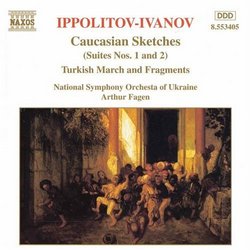| All Artists: Mikhail Mikhaylovich Ippolitov-Ivanov, Arthur Fagen, National Symphony Orchestra of Ukraine Title: Ippolitov-Ivanov: Caucasian Sketches; Turkish March and Fragments Members Wishing: 0 Total Copies: 0 Label: Naxos Release Date: 8/5/1997 Genres: Special Interest, Classical Styles: Marches, Forms & Genres, Symphonies, Symphonies Number of Discs: 1 SwapaCD Credits: 1 UPC: 730099440523 |
Search - Mikhail Mikhaylovich Ippolitov-Ivanov, Arthur Fagen, National Symphony Orchestra of Ukraine :: Ippolitov-Ivanov: Caucasian Sketches; Turkish March and Fragments
CD DetailsSimilar CDs
Similarly Requested CDs
|
CD ReviewsCapturing the Crossroads of Civilization Ian Vance | pagosa springs CO. | 04/09/2005 (5 out of 5 stars) "Russian composer Mikhail Ippolitov-Ivanov (1859-1935) is considered to be one of the lesser-known talents of the late Romantic/early Modern period, with his music rarely played in concert these days and his name shadowed over by such illustrious contemporaries as Rimsky-Korsakov, Tchaikovsky and Alexander Borodin. Indeed, a search on Amazon for a comprehensive package of this composer will yield only this CD, a sort of 'greatest hits' consisting of the Caucasian Sketches (Suites No. 1 and 2), the Turkish March, and the assembled Turkish Fragments, all conducted by Arthur Fagen with the National Symphony Orchestra of Ukraine. Information on the Internet is equally sketchy; a good deal of this review was paraphrased from the CD's liner notes. The son of a mechanic, Ippolitov-Ivanov studied in his youth at the Cathedral of St. Isaac, where he served as a choirboy, and later at the St. Petersburg Conservatory. He completed his studies with famed instructor/composer Nikolai Rimsky-Korsakov, and would owe a lifelong debt of influence to the master. The composer's first appointment was as a director of a music academy in Tiflis, Georgia, and Ippolitov-Ivanov spent seven years amidst the non-Slavic minorities of the region, absorbing their folk-music and culture. Upon returning to Moscow in 1893, the composer penned the two *Kavkasskiye Eskizi*, evoking the southern-exotic ambience of Georgia, particularly its amalgam of Christian and Islamic culture and the oriental influence of the region. Caucasian Sketches, Suite No. 1 begins with 'In a Mountain Pass', a landscape tone-poem wherein a simple melodic passage grows and swells, climaxing with percussive fills before reaching a gentle denouement. The second sketch, 'In a Village,' is bookended with an exotic violin riff and, as its centerpiece, contains a cheerfully rustic folk-song; 'In a Mosque' progresses naturally from its decline, serene and gliding, before the 'Procession of the Serdar' literally bursts into the atmosphere with its regal, parade-like culmination of the previous themes. Caucasian Sketches, Suite No. 2: "Iveria" refers to an ancient kingdom of this name, a Christian enclave and region marked as a meeting-point of civilizations, contested by Persia, the Ottoman Empire and finally Russia, courtesy of Catherine the Great. The suite starts off with the nine-minute 'Introduction: Lamentation of Princess Ketevana,' an initially somber preface that climaxes mid-way through, then scales back to its sorrowful motif. The tribal dance of the 'Lesghinka' builds methodically over the course of four minutes, erupting at last with pounding drums and furious string-work, and the 'Georgian March' carries the momentum with triumphant horns and another climax worthy of Borodin's *Prince Igor*. The 'Turkish March' crashes in and sounds like a natural accompaniment to the Sketches, rather than a musical piece published thirty-five years afterward. Ippolitov-Ivanov's interest in the folk-music of the Uzbek, Kazahk and Turkish regions received official encouragement from the Russian government, for its unifying principles; politically, however, Ippolitov-Ivanov retained a measure of independence, ignoring contemporary quarrels about the encroaching dissonance of modernism and the demands of "usefulness" in proletariat art. He had already developed his style in the 1880s and 90s, and the final selections on this CD, the Turkish Fragments, display vividly this particular style, a Romantic-era lushness wedded to oriental folk-music, similar in approach to that of Bartok. 'At Rest' has an ironic title, given its smashing momentum in the center; 'Night' glides calmly into the aptly-named 'Festival,' a rousing finale to this suite. If, gentle reader, you have a taste for exotic-tinged classical music, Ippolitov-Ivanov's `Caucasian Sketches' is a must-buy. Highly Recommended. " Must-Own CD for lovers of colorful Russian music! Ian Vance | 04/01/2004 (5 out of 5 stars) "The orchestral music of Ippolitov-Ivanov featured on this CD is very enjoyable, colorful, exotic music that shows the influence of the composer's mentor, Rimsky-Korsakov. With all due respect to the negative review, I feel that the performances are excellent and the Caucasian Sketches Suite No. 1 is the best performance of the piece I've ever heard. Add to that the budget price, and this becomes an absolute must-own CD for those who like this kind of music! You'll discover that there's much more to Ippolitov-Ivanov than the famous "Procession of the Sardar"." Already a favorite Michael Cornett | Takoma Park, MD USA | 11/22/2004 (5 out of 5 stars) "Spritely and exotic, this little gem is a lesser-known work of classical music (save for the "Procession of the Sardar"), is a great addition to any CD library. It's perhaps a little light, but the rich melodies and energetic rhythms will addict you. This would be a great soundtrack to a LOTR-type fantasy film. I've had this only for a short while but already it's practically being played to death!
One debit: the liner notes are a bit terse; I would appreciate more background on the music and the culture it portrays." |


 Track Listings (13) - Disc #1
Track Listings (13) - Disc #1











